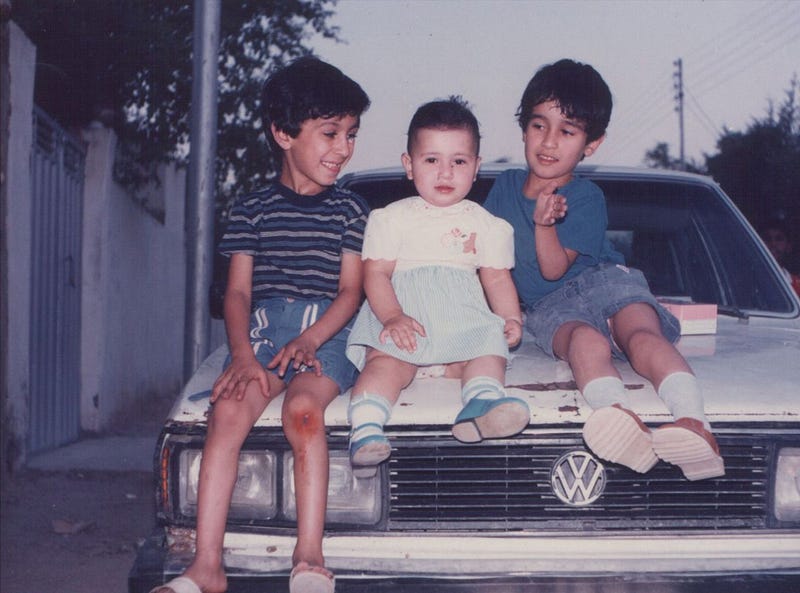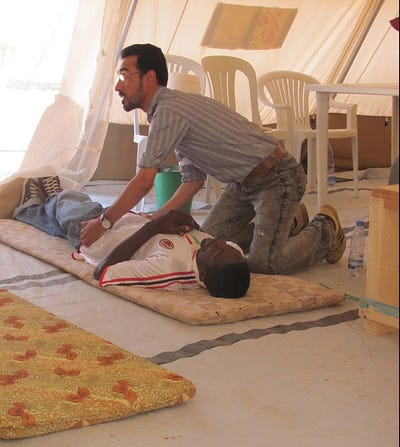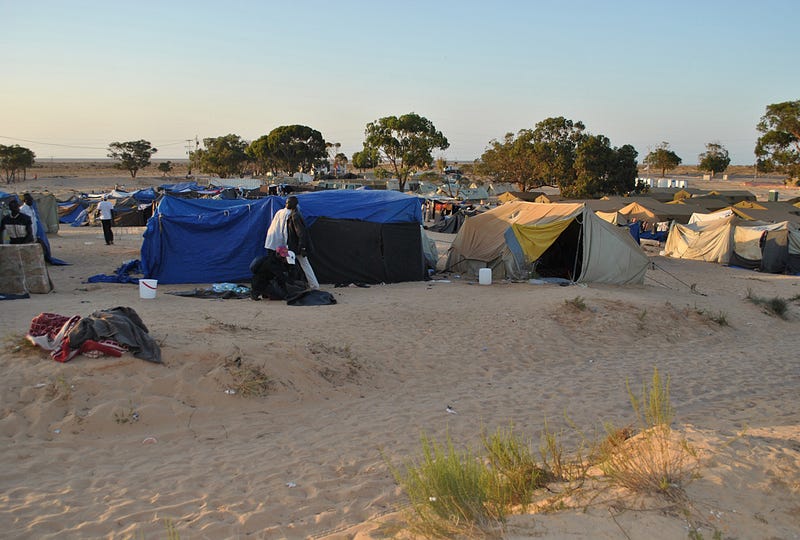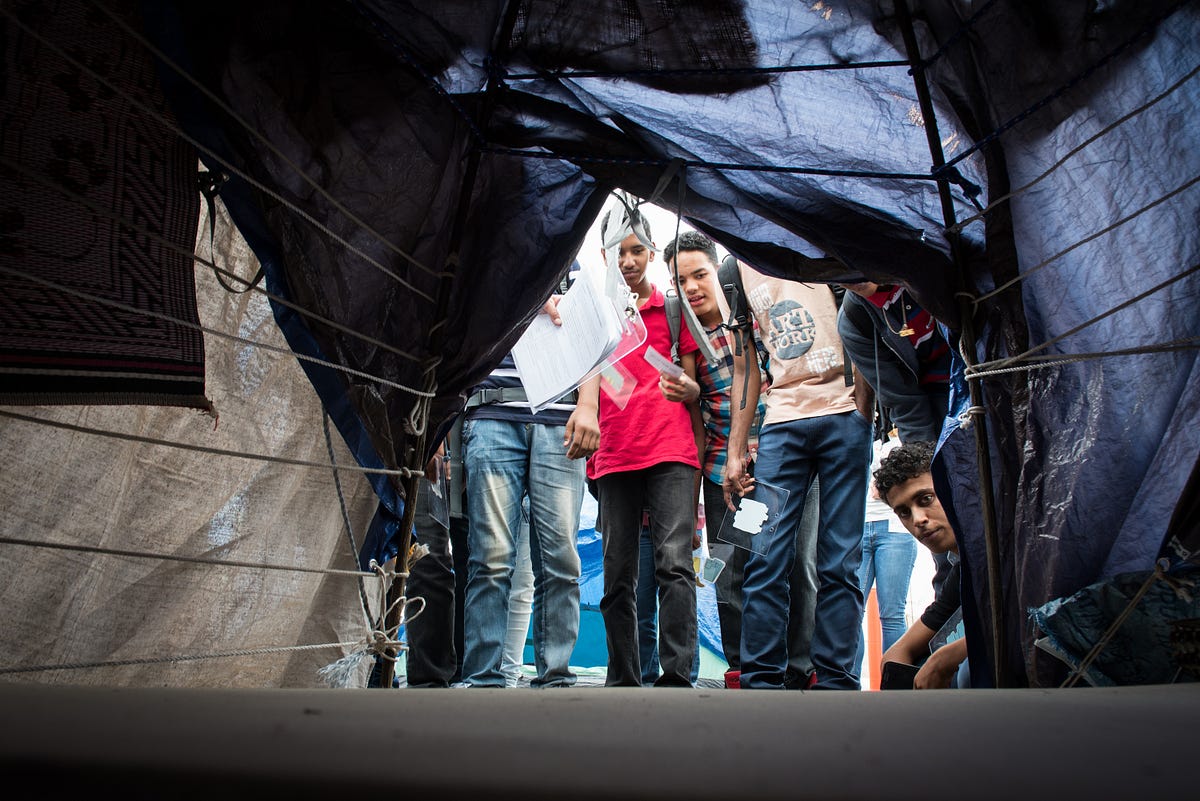Thousands of visitors in Boston toured the pop-up refugee exhibit at Long Wharf last week. The tour lasts 45 minutes, in which I, along with other aid workers, lead people through an interactive experience learning about the push factors that drive people to become displaced, and the medical needs inside refugee camps.
I’m a medical doctor who worked with Doctors Without Borders in a refugee camp in Tunisia in 2011. I am also a refugee who has experienced many of the hardships that are currently being discussed at the Forced From Home exhibit touring the United States.
Imagine a seven-year-old boy.
He hears bombing and runs down to the basement, because it’s the safest place, the place where he’s least likely to be hit by the bombs.
At seven, he can smell death, his tiny knees trembling from the loud terrifying sounds of a nearby missile. He hears the sound of breaking glass and windows.
How many of you can imagine an old lady, in her mid-sixties, leaning forward on her cane, fleeing the echo of the bombardment behind her. “I don’t care if you leave me alone here, it’s okay if I die,” she says to her grandsons, who start to run. With every stride they take, she gets farther away.
That lady was my grandmother. She died last year at the age of 90 and she survived the Gulf war. That kid was me, using the basement as a shelter. Years later in medical school, I learned that I had Post Traumatic Stress Disorder.
Recently, I saw some of the same imagery from my childhood on the news, through the photos of Omran Daqneesh, the little boy in the ambulance in Syria, bewildered, wiping the blood from his face after his house was bombed. I was shocked, thrown back into the past. There are similar incidents still taking place as I speak to you today.

My brother, sister, and me growing up in Iraq.
This is one of the reasons I am here. I want to share my story to convey some of the reality of what refugees, and those fleeing conflict zones, are going through.
In Iraq in 1998, I remember my mom imploring my dad, “I want to leave this place, I don’t want my kids to carry arms, or be trained with those monsters, I am tired of hiding them every night.” So we fled from Iraq to Jordan, from Jordan to Egypt, and from Egypt to Libya, where I spent almost a decade of my life.
The political situation in Libya started to change drastically in 2011. One night we heard clattering and rattling at our front door. Suddenly we started to hear strong booming sounds, like someone trying to break in. I opened the door — my mom and sister started yelling hysterically — it was the pro-Gaddafi men, they were yelling in my face, but they were looking for another man. We knew it was time to flee.
We moved to Tunisia where the UN was accepting refugees. There I lived in Shousha refugee camp, that vast desert, where I had to wait in very long lines to get my weekly shower and my meals.
While there I saw that MSF needed a physician so I applied. I was hired and began treating refugees, while I was a refugee.


Shousha camp, Tunisia in 2011
In the camp, we wear different clothes and have different beliefs, yet we suffer from the same hunger and pain.
One of my patients, he was 15-years-old, had lost his sight due to an infection in his cornea; simple surgery would restore his perfect vision. But when you are refugee you wait for years, even for simple surgery, even if you are a child.
After almost three years as a refugee in Tunisia, we were finally approved to be resettled in the U.S. We are still considered lucky because our resettlement took less than five years.
A refugee can be anyone.
A refugee is not constrained by color or race. Refugees are not necessarily people seeking financial stability. They can be artists, athletes, dancers, doctors, philosophers — humans with ambitions and dreams, which can be as simple as a safe place to live, with walls and a roof, absent of the dangers and fears they have been fleeing.
I have shared my story today in the hope that it will give people a better understanding of the images they see on the news. But my story is just one of more than 65 million — most of these stories will remain untold. This year, more than 3,000 people died while trying to reach the safety of Europe’s shores, many more remain missing. Each person leaves behind loved ones, ambitions, and dreams. I tell my story on behalf of them, because I am one of the ‘lucky’ ones.
October 26, 2016: Panel on Refugee Resettlement.
http://www.forcedfromhome.com/events/pittsburgh-webcast/
Since September, I have been a tour guide at a pop-up exhibit presented by
Doctors Without Borders. The outdoor exhibit is designed to raise public awareness about the experience of refugees and internally displaced people.
During the tour, I ask visitors to imagine that war has just broken out. They will have to leave their homes, their community. There’s a wall hung with plastic cards listing the most essential possessions. It is then that I tell these parents, grandparents, kids, teenagers, and college students, “You have thirty seconds. Pick 5 items to bring on your journey.”
They scramble to choose items they think would help. Some dash to grab water, blankets, passports. I begin a countdown, and see some families starting to work together to make their choices. Time is up, and I look at what they brought. I ask if anyone brought shoes. My mind goes back to being a little boy in Iraq in 1991. I tell the group:
“When my family fled, I remember we walked and we walked. We walked for 10 days — 10 days non-stop. I remember I had flip-flops on my feet. On the 10th day, I had nothing on my feet.”
In Washington, DC I was a tour guide with my brother Ayman, who also shared with visitors his experiences as a physician working with refugees.
This weekend, we’ll be giving tours in Pittsburgh. The last part of the Fall Exhibit ends in Philadelphia November 5 to November 13, 2016.
No one should live this life. As a physician and as a refugee, get to know us. Try to connect the dots. It’s a beautiful thing to witness the way people have reacted to the exhibit. They react as human beings.

Students peer into a camp tent. Photo: Edwin Torres